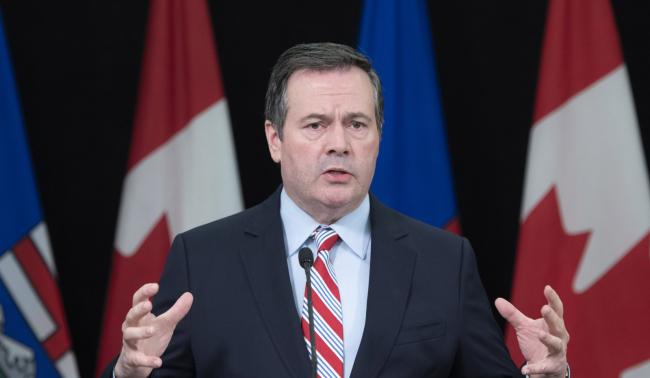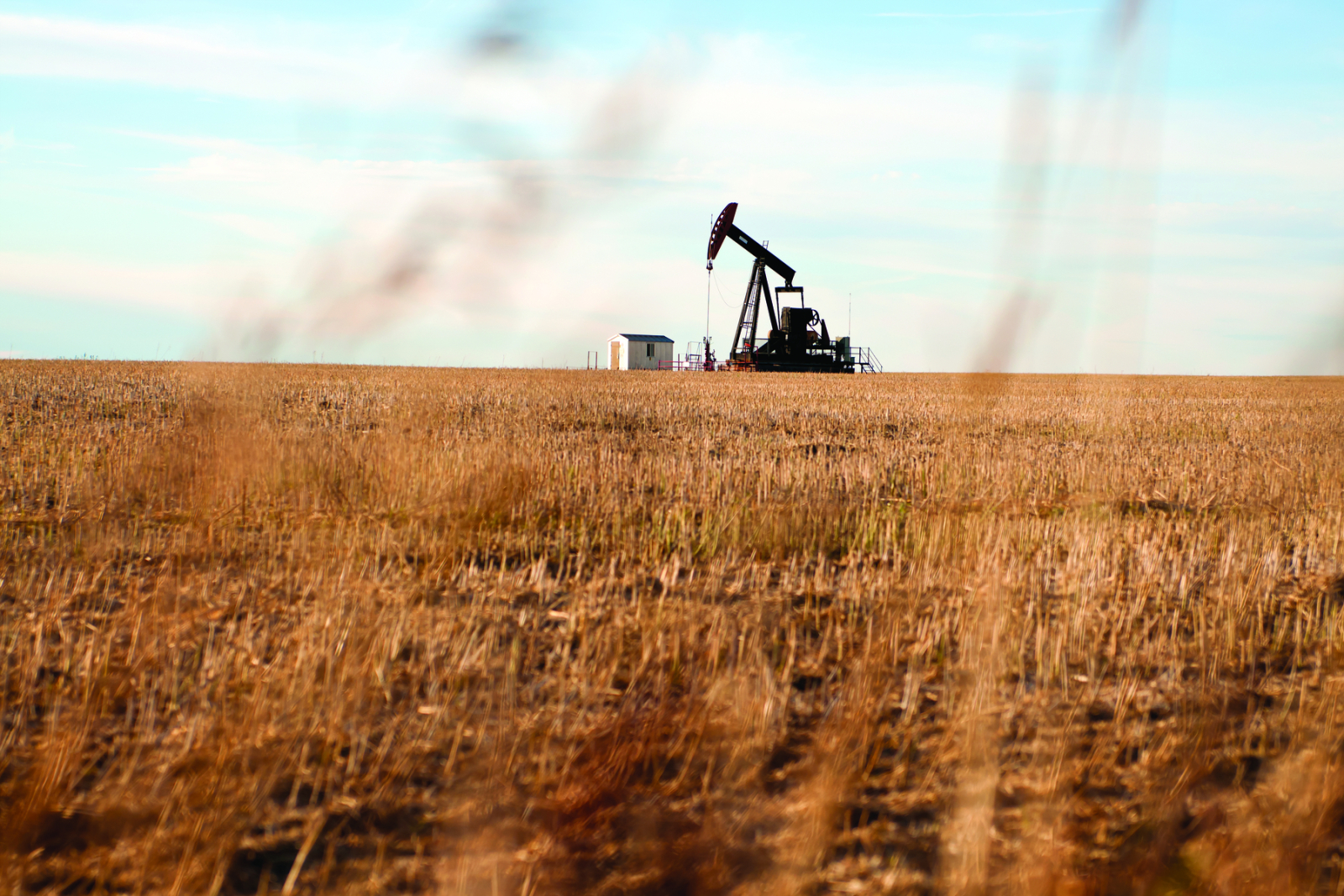Articles Menu

April 24th 2020
Alberta Premier Jason Kenney lashed out Friday at a reporter who asked him whether a transition toward renewable energy might be on the table as global crude prices plummet.
"With the oil and gas market taking such a hit, when do you start thinking about a transition away from fossil fuels?" Tom Ross, the reporter for Calgary's 660 News, asked.
"Our focus is on getting people back to work, not pie-in-the-sky ideological schemes," Kenney said, flanked by his energy and environment ministers.
[See link for videos in tweets.]
Kenney also called the Green New Deal a "fantasy." He then left the news conference, saying he had to go call the prime minister and other premiers, and left his energy and environment ministers to continue answering questions.
Oil prices have tanked in the recent months as the COVID-19 pandemic has brought petroleum demand to a halt. And the situation has been worsened by a price war between Russia and Saudi Arabia, which have both flooded the market with cheap oil. Now, unwanted crude is rapidly filling up storage capacity, and people with physical oil are quickly running out of places to put it.
American crude briefly went negative earlier this week, meaning sellers pay buyers to take the product away. At one point last month, Canadian crude cost about US$3 per barrel, less than a Big Mac.
Analysts expect oil prices to recover once the pandemic ends and demand returns, but it's unclear when that will be. The budget Kenney unveiled in February, which relied on $58 per barrel of oil — an optimistic projection at the time — is essentially out the window, and the premier has said Alberta's deficit stands to triple.
"That kind of question in the middle of an economic crisis from a Calgary-based media outlet really, frankly, throws me for a loop," Alberta Premier Jason Kenney told a reporter who asked him about transitioning to renewable energy.
Kenney pointed to projections showing that demand for oil will continue to increase for decades, scenarios that are also consistent with catastrophic levels of global warming, Julia Levin of Environmental Defence, a green non-profit, said in an interview. Transition is coming, she added, and if there isn't a plan to help oil and gas workers, those people will suffer, just as cod fisherman in Newfoundland suffered when that industry collapsed in the '90s.
"When you don’t take that transition seriously and you don’t plan for it, that’s when people face pain," she said. "The fact that the Government of Alberta is refusing to consider what that transition would even look like ... is problematic for Albertans."
University of Calgary political scientist Melanee Thomas said in an interview that Kenney's response to the reporter's question is a "hallmark of polarized politics," conflating oil and gas with Alberta's very identity. That's been a pattern with the premier's rhetoric, she said.
"It’s either you’re with us or against us ... You’re in Calgary, so you should be with us," she said.
"It’s corrosive to democracy. To use Jason Kenney’s own words, it suggests that any other way of thinking or speaking about politics is an existential threat."
Kenney had called Friday's press conference to unveil how his government would roll out $1 billion in grants under an oilpatch-aid package released by the federal government the previous Friday. That package offered Canada's oil and gas sector, which is largely centred in Alberta, a combined $2.5 billion. That figure includes $1.7 billion to fund the cleanup of aging oil and gas wells.
In Alberta, energy companies are required to clean the remnants of wells after they're done producing and return the land to its natural state. But after the last oil downturn in 2014, many companies with significant cleanup responsibility are under serious financial strain and unable to pay the bill.
An Orphan Well Association (OWA), funded by an industry levy and occasional government loans, handles the cleanup of wells that belonged to companies that have gone bankrupt without taking care of their environmental responsibilities. (Wells with no viable owner are called "orphans.")
There are also 91,000 inactive wells in Alberta that need to be decommissioned, many belonging to companies that remain solvent. Another 73,000 wells have been decommissioned, but the land they sit on still needs to be reclaimed, or returned to its natural state.
The federal government's bailout package is meant to address both orphan wells and inactive ones.
The program Kenney announced Friday will address inactive wells, beginning May 11, he said. The province projects it will create 5,300 jobs, with the first round of grants going to oilfield-services companies, often the economic backbone of communities in rural Alberta, for well cleanup work.
Depending on the well owner's ability to pay for cleanup, the government grant will cover between 25 and 100 per cent of the cost, Alberta Energy Minister Sonya Savage said.
The province will give grants in $100-million increments. It's not clear where future rounds of funding will go.
Though the idea of creating jobs to handle well cleanup is a good one, the way the government is executing the program could allow companies to pass the buck to taxpayers, critics said Friday.
The government should have set up the program as loans that would eventually need to be repaid rather than grants, said Nikki Way, a senior analyst for the Pembina Institute, a clean-energy think tank. The announcement also left out many details, she said, including whether bankrupt companies whose wells would have been transferred to the OWA would receive the grants.
"It should be on industry to pick up the pieces of the wells that fall through the cracks," she said in a phone interview, adding that the industry has committed to footing such costs through the OWA.
“We really should not be providing these dollars to wells that were on track to go to the OWA.”
Levin said the program should have included strings to hold companies accountable for their messes, and it should have oversight from Indigenous stakeholders and municipalities. (Some struggling oil and gas companies have stopped paying municipal taxes, denting local government balance sheets, and have failed to make lease payments to landowners whose property the wells sit on.)
“What we see is a bailout to companies who haven't cleaned up their own mess, with no conditions to ensure it doesn’t continue," Levin said.
Albertans and Canadians should be outraged that their tax dollars are going to companies that failed to set aside enough money to fulfil their environmental responsibilities, said Regan Boychuk, co-founder and lead researcher of the Alberta Liabilities Disclosure Project, an advocacy group that pushes for government accountability on oil and gas cleanup costs.
"Provincial and federal law are clear: industry, not taxpayers, must fund the cleanup of old oil and gas infrastructure," he said in a statement. "By releasing $1 billion in Canadians’ tax dollars as grants, not loans, to industry, the Alberta government is bailing out oil and gas companies that have profited from our public resources, but now refuse to adequately fund their own cleanup."
It could take more than 2,800 years to clean up some of the wells dotting Alberta's landscape, a senior official from the Alberta Energy Regulator has told industry.
And in a private presentation in 2018, a high-ranking official from the Alberta Energy Regulator estimated it could cost $260 billion to clean up all environmental liabilities, including problematic wells, pipelines and tailings ponds. The presentation, brought to light by National Observer, Global News and the Toronto Star, described that figure as “likely less than the actual cost" and warned liabilities from conventional wells were growing.

From the start, Kenney's United Conservative government has hitched its wagon to the oil and gas industry. And as that industry becomes less viable long-term, that presents an increasing level of political risk, Thomas said.
Kenney is likely aware that the question of a green transition is a fair one, she added. But previous Alberta politicians who have pointed to a future beyond oil and gas have felt the consequences — the late premier Jim Prentice, for example, was handed a devastating election loss when he said he was working on a plan to get the province off the highs and lows of the petroleum business.
If Kenney relaxes any of the government's "rigid assumptions" about the viability of the industry, he could face repercussions from its oil and gas-supporting base, Thomas said.
“I think they’ve painted themselves into a corner," she added. "It’s like a house of cards. If they start to give on any part of this, it all starts to fall apart.”
Admitting that Alberta must have a plan to transition to a low-carbon world could also mean admitting that ventures like the government's $30-million "war room," which counters negative narratives about Alberta energy, might have been the wrong move, Thomas said. The same could apply to the government's recent decision to invest $1.5 billion in the Keystone XL pipeline after laying off education workers.
Thomas said she doubts the Alberta government will change direction unless the current oil-price downturn stretches on into 2021, a deeply dire scenario that could "unsettle" the United Conservative base.
"I don’t think this is good governance," Thomas said. "Being able to be open-minded to the point where you can engage with being flexible is a hallmark of better policy."
Levin said Alberta would be better served by beginning to make a plan now to help oil and gas workers through a transition to renewable energy. Canada is currently in the midst of a historic injection of federal money into the economy, with Ottawa pouring cash into keeping businesses and people afloat during COVID-19 — those funds could be used to support green, job-creating industries like renewable energy, she said.
This week, a report by the left-wing think tank Progress Alberta found that Alberta Investment Management Corp., or AIMCo, lost millions of dollars after investing $1.1 billion in junior and intermediate oil and gas firms. At least one of the those firms went bankrupt despite the infusion of cash.
"This industry has been on a decline for a very long time," Levin said, pointing to the AIMCo's losses. “Throwing money at these companies isn’t going to save them."